

Poerup. It's An Open Book: Adopting Open Textbooks. Five critiques of the open educational resources movement - Teaching in Higher Education - Volume 18, Issue 8. This paper will review existing literature on Open Educational Resources (OER).
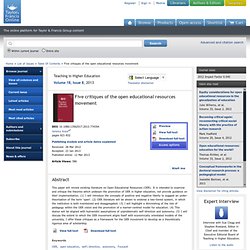
It is intended to examine and critique the theories which underpin the promotion of OER in higher education, not provide guidance on their implementation. (1) I will introduce the concepts of positive and negative liberty to suggest an under-theorisation of the term ‘open’. (2) OER literature will be shown to endorse a two-tiered system, in which the institution is both maintained and disaggregated. (3) I will highlight a diminishing of the role of pedagogy within the OER vision and the promotion of a learner-centred model for education. (4) This stance will be aligned with humanistic assumptions of unproblematic self-direction and autonomy. (5) I will discuss the extent to which the OER movement aligns itself with economically orientated models of the university.
I offer these critiques as a framework for the OER movement to develop as a theoretically rigorous area of scholarship. Keywords Related articles. David Thornburg on Open-Source Textbooks. Editor's Note: Today's guest blogger is David Thornburg, Ph.D., a futurist, author, consultant and founder and Director of Global Operations for the Thornburg Center.
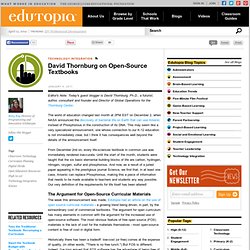
The world of education changed last month at 2PM EST on December 2, when NASA announced the discovery of bacterial life on Earth that can use Arsenic instead of Phosphorous in the construction of its DNA. This may seem like a very specialized announcement, one whose connection to our K-12 education is not immediately clear, but I think it has consequences well beyond the details of the announcement itself.
From December 2nd on, every life-sciences textbook in common use was immediately rendered inaccurate. Until the start of the month, students were taught that the six basic elemental building blocks of life are carbon, hydrogen, nitrogen, oxygen, sulfur and phosphorous. Open Educational Resources (OER): Resource Roundup. Resources by Topic: OER, a part of the global open content movement, are shared teaching, learning, and research resources available under legally recognized open licenses -- free for people to reuse, revise, remix, and redistribute.
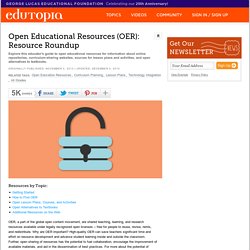
On Quality and OER. As I travel the country (and the world) telling people about open educational resources, open textbooks, etc., I frequently receive questions about the quality of openly licensed instructional materials.
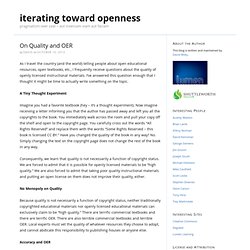
I’ve answered this question enough that I thought it might be time to actually write something on the topic. A Tiny Thought Experiment Imagine you had a favorite textbook (hey – it’s a thought experiment). Now imagine receiving a letter informing you that the author has passed away and left you all the copyrights to the book. You immediately walk across the room and pull your copy off the shelf and open to the copyright page. Consequently, we learn that quality is not necessarily a function of copyright status.
No Monopoly on Quality Because quality is not necessarily a function of copyright status, neither traditionally copyrighted educational materials nor openly licensed educational materials can exclusively claim to be “high quality.”
Five critiques of the Open Educational Resources movement. This is an Author’s Original Manuscript of an article whose final and definitive form, the Version of Record, has been published in the Teaching in Higher Education 2013 [copyright Taylor & Francis], available online at: DOI:10.1080/13562517.2013.774354].
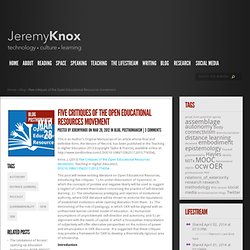
d3n8a8pro7vhmx.cloudfront.net/lumen/pages/58/attachments/original/1368052384/open-science-textbook-process.pdf?1368052384. One college’s use of an open psychology textbook - Open Learning: The Journal of Open, Distance and e-Learning - Volume 27, Issue 3. OU students and staff Sign in with your OU Computer username.
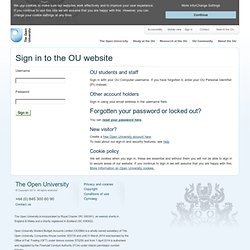
If you have forgotten it, enter your OU Personal Identifier (PI) instead. Other account holders Sign in using your email address in the username field. You can reset your password here. New visitor? Technology: The textbook of the future : Nature News. OU students and staff Sign in with your OU Computer username.
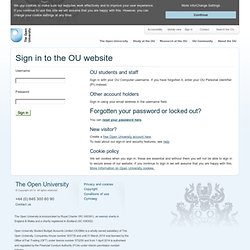
If you have forgotten it, enter your OU Personal Identifier (PI) instead. Other account holders Sign in using your email address in the username field. You can reset your password here. New visitor? Create a free Open University account here. Cookie policy We set cookies when you sign in, these are essential and without them you will not be able to sign in to secure areas of our website. The Trouble with Textbooks - Public Services Quarterly - Volume 9, Issue 3. Examining the reuse of open textbooks. John Hilton III and David A. Wiley Brigham Young University, USA Neil Lutz Rutgers University, USA Abstract.
Open Educational Resources: A Review of the Literature. 'Bookless' textbook study launched at Foothill. Sites/oerknowledgecloud.org/files/960-8024-2-PB.pdf. Sites/oerknowledgecloud.org/files/pub_OER_BusinessCase.pdf. Www.hewlett.org/uploads/files/OpenTextbooks.pdf. Open textbook adoption and use: implications for teachers and learners - Open Learning: The Journal of Open, Distance and e-Learning - Volume 26.